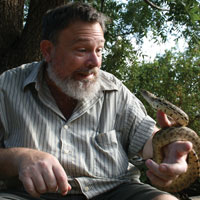
Born to be Wild
Story and Photo by Macy King
Imagine yourself walking down a hallway filled with students, turning a corner and coming face-to-face with a four-foot long bull snake. If you walk through the halls of the Department of Natural Resources Management, expect the unexpected.
The Character
Gad Perry, Ph.D., is an associate professor of conservation biology. Perry is known throughout the College of Agricultural Sciences and Natural Resources as a unique individual. To further prove his individuality, a Lubbock resident once rescued a bull snake and brought it to Perry, and he walked around the building with it around his neck for the day.
“People thought that was strange. I don’t know why, but there you have it,” Perry said.
Kerry Griffis-Kyle, Ph.D., said she is very used to Perry’s individuality since they share an office suite.
“It is not necessarily weird to see someone walking around with a snake on their shoulders in biology or conservation,” Griffis-Kyle said.
Some may find Perry unusual in cargo shorts, a short-sleeved shirt and sandals throughout the year. No matter the occasion, you will rarely see Perry in a suit and tie. He claims to have never worn a tie in his life and he is comfortable wearing shorts and sandals. Just looking at Perry, most would think he is a bit eccentric. Not many, however, get to see the family man, the conservationist or the friend to all species.
Perry’s interest in reptiles and other animals started very early. His father introduced him to different types of wildlife at a young age.
“I have been chasing animals since I was six or so,” Perry said. “I knew I wanted to be a field biologist that early.”
His one dangerous snake bite was at the age of 12 while handling a rare, venomous stiletto snake.
“It’s not like it was going after me; I was dumb. I deserved what I got,” Perry said. “Luckily, it wasn’t too bad.”
After realizing his true calling, Perry came from Israel to the United States for his doctoral degree. He met his wife, Kate LeVering, while attending graduate school at the University of Texas. After finishing his doctoral degree, Gad and Kate planned to return to Israel. Instead, they were blessed with twin boys, Ian and Negev, and decided to make Lubbock their home.
The Family Man
One of the reasons they decided on Texas Tech is, unlike other universities, the administration has the realization that faculty are people too. While he only gets paid for a 40-hour-week, his dedication to his job goes way beyond.
“After work, I go home and as soon as the boys are in bed, I get on my home computer and work,” Perry said.
Though he does not have much time for hobbies these days, Perry said he really likes listening to music and reading. Perry still has a huge stack of compact discs. His favorite artists and genres are Mozart, Israeli and Irish folk music, ABBA, Vivaldi and Costa Rican music.
“If I had an iPod, I would lose it or break it,” Perry said. “I try to avoid a cell phone: those are evil!”
Even though he has to leave his family at times for research, he said he realizes that his family is more important and the job is not everything. Perry explained that one does not find a lot of people in it for the money or the perks. He is in conservation because he really enjoys it.
“It is certainly not for everyone, but if you like thinking and want to make a difference, it is not a bad field to be in,” Perry said.
The Scientist
His research focuses on the conservation of endangered species, the management of invasive species, and the biology of reptiles. He has authored a textbook and numerous scientific articles, and is a member of several professional associations, such as the Society for Conservation Biology, Texas Academy of Science, Society for the Study of Amphibians and Reptiles, and Partners in Amphibian and Reptile Conservation.
Perry has had the advantage of getting to interact with a variety of different animals. He has worked with a species of iguanas in the Virgin Islands with a population of about 300 worlwide.
“I got to go swim in the Amazon with river dolphins,” Perry said. “How many people have done that in their lifetime?”
One of his favorite moments was in Costa Rica in the Corcovado National Park. It has native forests, six species of wild cats, four species of monkeys, macaws and tapirs.
“There is really little that can compare to sitting in the forest alone; you can’t hear or see people,” Perry said. “There is a lot happening all of the time. It is a very intense, quiet, minimalistic experience.”